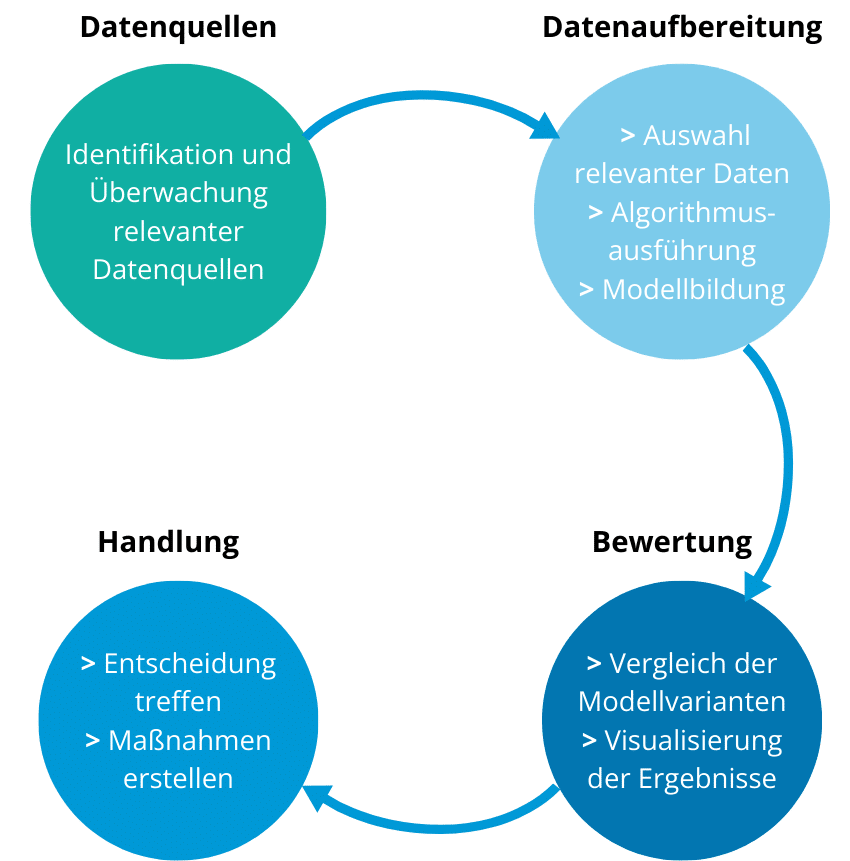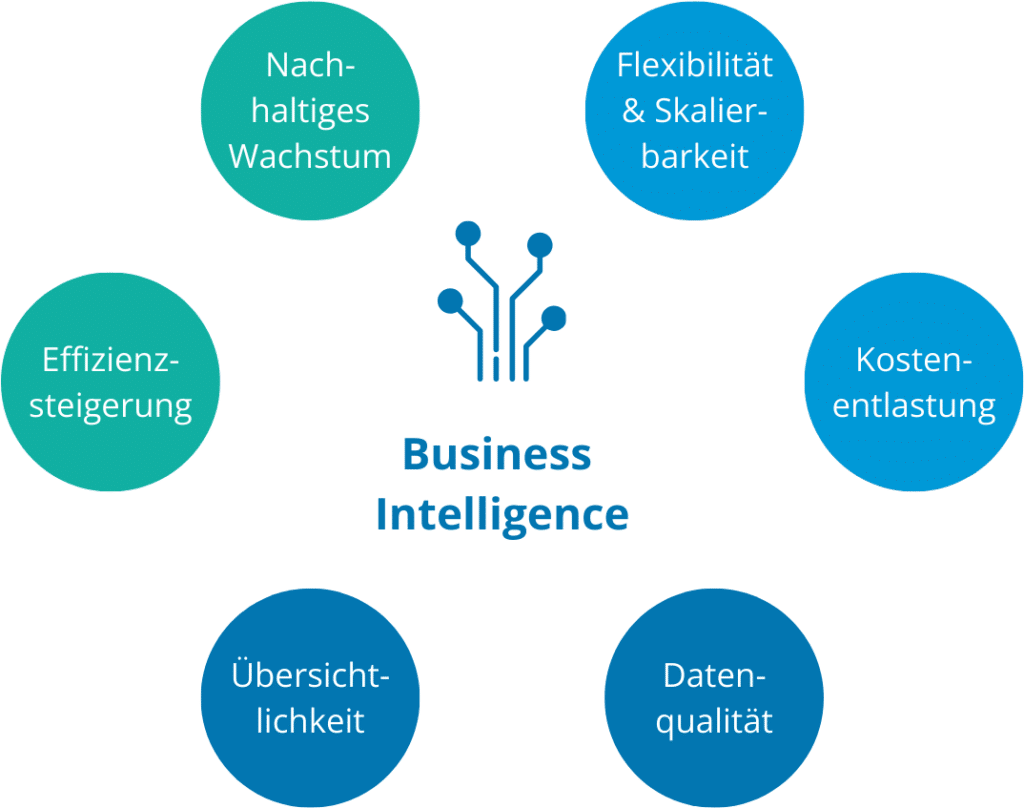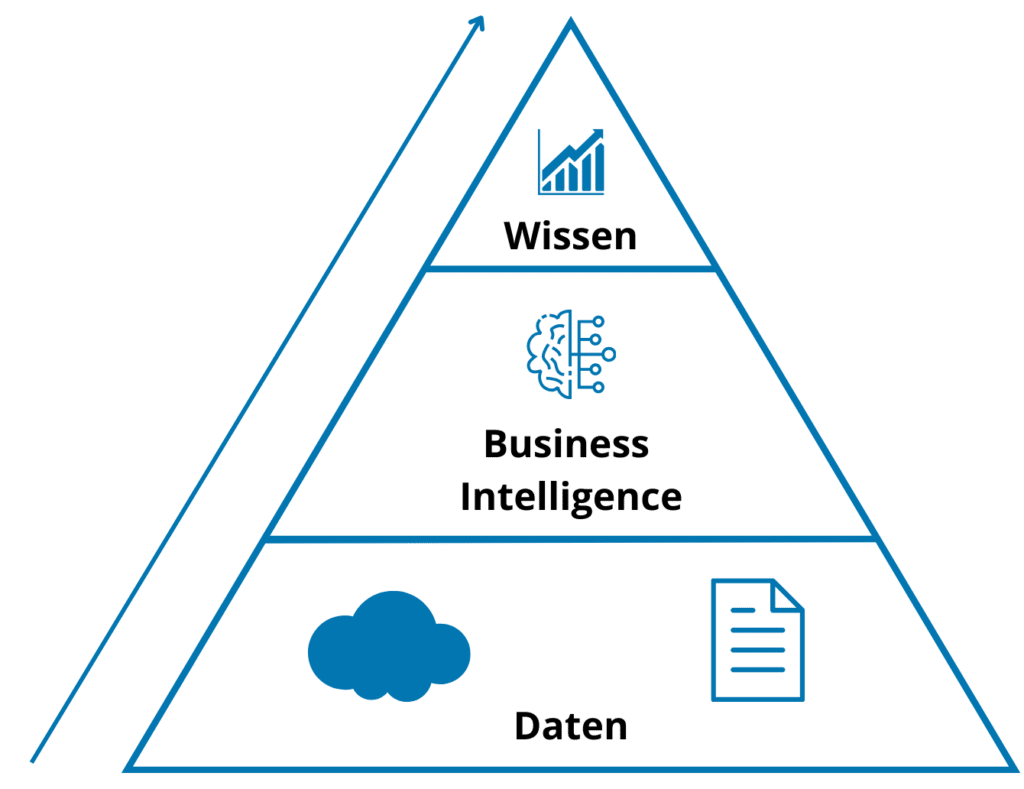From data to insights: How business intelligence & business analytics are revolutionizing the business world
In this fascinating world of Business Intelligence & Business Analytics, doors are opening to strategic innovation and proactive corporate management. Data is analyzed and transformed into a valuable resource that enables companies to adapt dynamically to change and stay one step ahead of the competition. Join us on this exciting journey where data is more than information, it is the key to sustainable success in today's business world.
Business Intelligence (BI) is far more than just the comprehensive analysis of company data. It means gaining a clear insight into past performance in order to develop future strategies on this basis. On the other hand, business analytics (BA) goes one step further by drawing on historical data as well as predictive analysis and innovative models to make reliable predictions for the future.
91%
of companies that use BI tools state that they have achieved faster reporting, analysis and planning.
What does BI & Analytics achieve in your company?
Improved decision-making
BI & Analytics enable informed decisions as they provide a clear insight into past performance and future trends.
Increased efficiency
By analyzing business processes, inefficient areas can be identified and optimized.
Creating competitive advantages
BI & Analytics help to understand market trends and facilitate the development of innovative strategies to compete in a constantly changing environment.
Enhancing customer understanding
The analysis of customer data provides a deeper understanding of customer preferences and behaviour, which in turn can be used in personalized marketing strategies.
Cost optimization
BI & Analytics help to identify potential cost savings by highlighting unnecessary expenditure and suggesting efficiency improvements.
Forecasting the future
Business analytics, in conjunction with Artificial Intelligence (AI) offers predictive analyses that help companies predict and prepare for future trends.
Success factors of Business Intelligence projects
In today's dynamic business world, it is crucial for managers to react to developments at an early stage and derive suitable measures. Business Intelligence & Analytics are indispensable tools for adapting the area of responsibility to changing conditions and staying one step ahead of the competition. Despite their importance, these tools sometimes meet with limited acceptance, as their use is often restricted to controlling and company management. However, there is an opportunity to expand their use across different departments as data plays a central role in companies of all sizes. Business intelligence and big data are relevant for large companies, but are also indispensable for medium-sized companies. Innovations in the product and service portfolio as well as in business processes are decisive success factors. This is why solutions for decision optimization through business intelligence and big data are becoming increasingly important.
Business Intelligence for SMEs
The importance of Business Intelligence (BI) extends not only to large companies, but also to small and medium-sized enterprises (SMEs).
SMEs in particular can use BI to optimize their operational processes and use existing resources more efficiently. Analyzing data makes it possible to identify weak points, improve processes and reduce costs. In a globalized business environment, SMEs also need to be competitive. BI makes it possible to react quickly to market changes, identify trends and make well-founded decisions in order to succeed in a competitive environment.
The data-driven approach of BI strengthens the agility and flexibility of SMEs. Understanding customer needs, market trends and operational challenges helps to make faster and more accurate decisions. Customer orientation is further promoted by BI, as companies can better understand their customers. The analysis of customer data enables the development of personalized offers and services, which leads to greater customer loyalty.
Challenges for companies in the area of Business Intelligence & Analytics
The constant development of the business world and the increasing flood of data present companies with the task of collecting, managing and using their data effectively.
The quality of the available data is another challenge. Before companies can implement complex analysis projects, they must ensure that their database is free of duplicates and has been harmonized. Data silos must be broken down in order to create a uniform and reliable basis for BI and analytics. The security and resilience of the IT infrastructure are crucial in this regard, especially with regard to the performance and protection of sensitive data.
Advantages of digital business intelligence software
- Real-time analysis:
Immediate provision of real-time data enables fast and agile decisions. - Automation:
Automated data preparation and analysis reduce the manual workload. - Self-service functions:
Employees can independently access relevant data and carry out analyses. - Innovative technologies:
Integration of Artificial Intelligence (AI) and Machine Learning (ML) for advanced analysis methods. - Increasing efficiency:
Optimization of business processes through efficient use of resources. - Competitive advantage:
Predicting future trends for sustainable competitive advantage. - Flexibility:
Flexible deployment options, including cloud-based services, for scalability and adaptability. - Holistic data integration:
Integration of different data sources for a coherent and comprehensive view of the company. - Security and data privacy:
Implementation of tight security measures to protect business-critical data. - User-friendliness:
Intuitive user interfaces and user-friendly dashboards make it easier to interact with the data.
functions of Microsoft Power BI Solution
Data visualization and reporting
Microsoft Power BI enables an appealing and meaningful visualization of company data.
Users can create interactive dashboards and reports to transform complex data into understandable information.
A variety of charts, graphs and interactive elements help to identify trends and patterns.
Self-service analysis and data exploration
Users can perform their own analyses and create personalized reports without in-depth IT knowledge.By integrating natural language processing, users can convert complex queries into understandable language.The self-service approach enables specialist departments to access data quickly and make informed decisions.
Integration and cooperation
Power BI is seamlessly integrated into Microsoft ecosystems such as Microsoft Azure, Excel, SharePoint and Teams.
By sharing dashboards and reports in real time, teams can collaborate more effectively.
Connectivity to a wide range of data sources, including cloud-based and on-premises data, ensures comprehensive data utilization.
More information on Power BI products and services
Find out more about Power BI on our website: https://www.inkubit.com/solutions/microsoft-power-bi/





